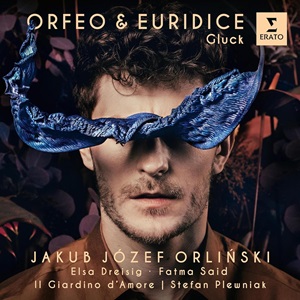
Christoph Willibald Gluck (1714-1787)
Orfeo ed Euridice (first version, Vienna, 1762)
Orfeo: Jakub Józef Orliński (countertenor)
Euridice: Elsa Dreisig (soprano)
Amore: Fatma Said (soprano)
Il Giardino d’Amore / Stefan Plewniak
rec. 2023, Polish Radio, Studio 52, Warsaw, Poland
Booklet with Italian libretto and commentary in English, French, and German included
Erato 5419789753 [85]
Christoph Willibald Gluck’s three-act ‘Azione teatrale per musica’ Orfeo ed Euridice has not been fortunate on record until recently because performing editions have tended to transpose Orfeo’s register and arrange the score in ways that the composer never authorised. Gluck prepared three primary versions of Orfeo ed Euridice: the original premiered on 5 October 1762 at the Burgtheater in Vienna with an alto castrato as Orfeo; the one-act Atto d’Orfeo was first performed during the wedding celebrations for Archduchess Maria Amalia of Austria and Infante Ferdinand of Spain in Parma on 24 August 1769 with a soprano castrato as Orfeo; and the expanded Orphée et Euridice received its first performance on 2 August 1774 at the Académie Royale de Musique in Paris with a haute-contre as Orphée.
The librettist Ranieri de’ Calzabigi reduced the characters from the ancient Greek legend to three plus a chorus and invented an ending in which Orfeo and Euridice are reunited even though he violated the injunction not to look at her before leaving the underworld. In Calzabigi’s adaptation, the conflict between love and obligation to follow divine decree places tremendous responsibility on the singer of Orfeo. He must express these emotions without interacting with the range of characters available, for example, in Claudio Monteverdi’s L’Orfeo (1607). Calzabigi gave only one god an individual profile: Amore intervenes in the first act to prevent Orfeo from succumbing to despair.
Gluck’s original score (1762) is the basis for most period-instrument recordings, including René Jacobs (2001) in which all three principal singers are excellent, especially Bernarda Fink as Orfeo. This new release, conducted by Stefan Plewniak, replaces Jacobs as my reference. The countertenor Jakub Józef Orliński, who exudes genuine passion without ever sounding exaggerated or striving for effect, portrays a lovelorn Orfeo, determined to overcome even death itself to be with Euridice. Orliński’s only rival as Orfeo is Cecilia Bartoli, who I saw during the Salzburger Pfingstfestspiele 2023. Once sufficient time has passed to reflect on Orliński’s achievement in this recording, critics will recognise his renditions of ‘Chiamo il mio ben così’ and ‘Che farò senza Euridice?’ as the finest on record.
Elsa Dreisig’s fervid, beautiful ‘Qual vita è questa mai … Che fiero momento!’ leaves no doubt that Euridice’s entreaties for Orfeo to look at her are irresistible. Fatma Said gives Amore a flirtatious, ingratiating personality in ‘Gli sguardi trattieni’, the only aria for this small, but dramatically crucial role. Said is the most convincing Amore since Regula Mühlemann, who, as far as I am aware, has never been involved in a complete studio recording of this opera.
The choir and orchestra of Il Giardino d’Amore, conducted by Plewniak, play and sing immaculately with panache and verve. Erato’s issue, which fits all of this concise ‘reform opera’ onto one disc, makes Gluck’s masterpiece accessible and enticing.
In the booklet note, Orliński states that it has been his long-standing dream to record this role. This recording is a triumph for him and, taken as a whole, a standard against which other interpretations of Orfeo ed Euridice must be measured.
Daniel Floyd
Buying this recording via a link below generates revenue for MWI and helps us keep free access to the site



















